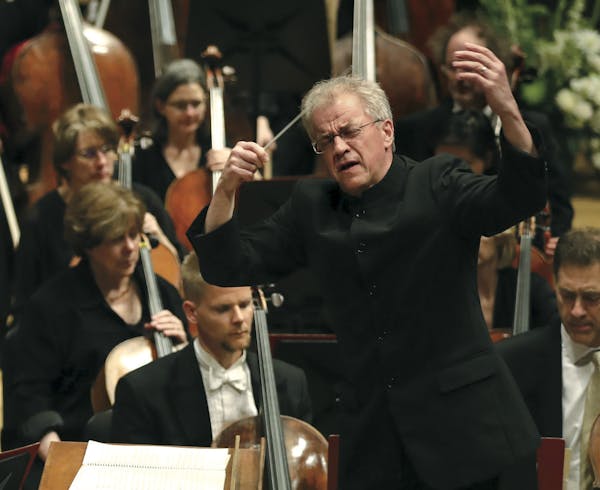What do you do with a country that eats tar and beats itself naked, whose national character is defined by stubbornness carried beyond all reasonable bounds?
You throw it a festival, of course.
FinnFest USA, a celebration of Finnish-American culture, returns this weekend to Minneapolis, the city where it was founded in 1982. This year's festival marks the 100th anniversary of Finland's declaration of independence, when the Scandinavian nation broke free of Russian domination in 1917.
In a nice coup, the festival's organizers arranged for a rare U.S. visit from Finnish President Sauli Niinistö, who has been the political leader of the nation of 5.5 million people since 2012.
Minnesota has long been a center of Finnish-American life, with more people of Finnish descent living here than in any other state except — maybe — Michigan.
Perhaps it's no surprise that the Finns found such a comfortable home here, said Philip Brunelle, whose VocalEssence chorale will perform a program of Finnish music at the festival on Sunday.
"It's a fascinating country," said Brunelle, who has visited Finland a number of times. "When you get out in the country, you go, 'I must be in northern Minnesota.'
"You'd go, 'Oh, my word — are we in Hibbing?' "
The festival includes art, drama, music, food and other features that try to capture the essence of a nation that remains something of a mystery even to its closest neighbors.
Consider sisu, a quality that Finns have lived by for centuries. According to scholars, it's a concept that can't really be fully translated into other languages. But the best approximation is extraordinary determination in the face of adversity.
"Sisu is an inherent characteristic of the Finnish people," writes Emilia Lahti, a doctoral student at the University of Aalto in Helsinki who has devoted her professional life to the study of sisu. "You might call it backbone, spunk, stamina, guts, or drive and perseverance.
"Sisu has sustained the Finns in fighting 42 wars with Russia and losing every one. It's the quality that lets them laugh at themselves in the face of disaster."
But does it explain the Finnish love of tar?
Befitting a people bred to the forest, the Finns have a deep belief in the power of wood tar. They put it in beer, in shampoo, even in candy and ice cream.
There's a saying in Finland: "If sauna, vodka and tar don't help, the illness is fatal."
The Finns also love salmiakki, a salty licorice; mojakka, a fish soup; and mämmi, a gooey dessert made of rye flour and molasses. They're sometimes alone in their appreciation.
Mämmi "tastes like Finland, because it is sweet but sad inside," said a man sampling the dessert for the first time in a YouTube video.
With food comes knives, and the Finns prize the puukko, a small belt knife that can be used for eating, working or fighting. So ubiquitous is the puukko that the word for stabbing in Finnish is puukottaa.
The Finns can be vicious fighters, as evidenced by their performance in the Winter War of 1939 and 1940, when they gained the world's admiration by holding off a Russian invasion of 450,000 troops with less than a third as many Finnish soldiers.
But the Finns' Scandinavian neighbors often make fun of their alleged propensity for sudden outbreaks of violence. The Swedish comedy group Grotesco produced a series of comic shorts based on the notion of Finns as heavy drinkers ready to pull out their knives on a moment's notice.
Yet in their century as an independent nation, the Finns have given the world an array of striking art, such as the architecture of Eero Saarinen. Minnesota's own David Salmela has carried on in the modern architectural style associated with the Finns.
Finnish musicians include Jean Sebelius, whose work will be featured in the festival.
"All of these things became part of the pride they had" in their new nation, Brunelle said.
Mark Sedio, director of the Augsburg University Choir, added that the Finnish language — in which the vocal stress is always placed on the first syllable of a word — gives Finnish choral music a sound and feel unlike any other.
The flip side of sisu is the sauna, a Finnish institution that represents relaxation, community and mental as well as physical health. With more than 3 million saunas in Finland, it's unusual to find a household without one. The sauna ritual is ingrained in Finnish life — and yes, they do beat each other with birch boughs, although it's not mandatory.
As Minnesota celebrates these tough, quirky northerners, there's one thing we can be sure of. No matter how much tar beer they drink this weekend, no matter how late they swelter in the sauna, the Finns will be at work Monday morning.
How do we know? A few years ago, Finland's largest newspaper polled 1,000 Finns on issues of morality. Leaving aside things like rape and murder — "which are universally condemned," the paper noted — one issue topped the list of "don'ts," with 85 percent of the people saying it was wrong:
Calling in to work sick when you're not.
Now that's some real sisu.
John Reinan • 612-673-7402

Four Minnesotans catch salmonella in outbreak linked to basil sold at Trader Joe's

Rep. Omar's daughter arrested, suspended from college for pro-Palestinian protests
Hopkins parents charged in 9-year-old daughter's asthma death

Back to blue: Lake Harriet Band Shell renovation almost finished

